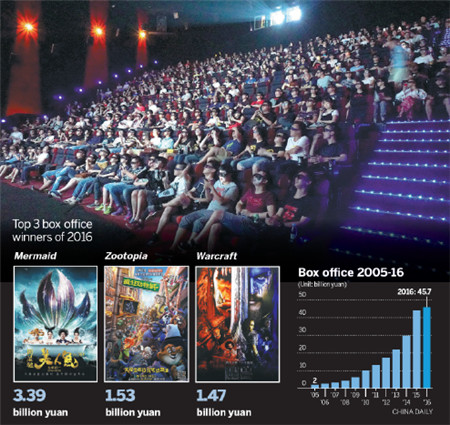Film industry at turning point as bubble bursts, tastes change
 |
|
[Photo by China Daily] |
Insiders say there's a silver lining to stagnant box office takes in 2016. Box office takes for China's film industry remained stagnant in 2016, but most industry insiders see it as a blessing in disguise.
Last year's box-office total was predicted to reach 60 billion yuan ($8.64 billion). Instead, at 45.712 billion, it grew a mere 3.73 percent over 2015's 44 billion yuan, the lowest in a decade.
However, experts said 2015's 49-percent growth rate, the highest on record, was partly the result of a bubble.
Although box-office receipts stalled in 2016, the buildup of movie theaters rushed ahead at breakneck speed, with about 26 new screens a day, or 9,552 in a year. China now has 41,179 movie screens in total, the most in the world, and 85 percent of them are capable of projecting 3-D films.
Newly released data by the State Administration of Press Publication, Radio, Film and Television, the industry's regulator, shows that domestic films accounted for 58.33 percent of the year's box office total. Annual attendance reached 1.37 billion tickets, an increase of 8.89 percent year-on-year.
In the same report, overseas box office figures for Chinese films were shown as 3.825 billion yuan, a rise of 38 percent. The number of feature films produced in China was 772, with an additional 49 animated features.
There was a sweeping transformation in the early summer of 2016 when ticket subsidies were phased out. Such subsidies, mostly from online retailers, reportedly accounted for 10 percent of 2015's total take. Subsidy-enabled low prices were blamed by many for creating a new audience mentality that movie tickets should be much lower than normal.
Worse than subsidies was so-called phantom attendance, which refers to blocks of seats bought by the film companies themselves to create an illusion of high audience turnout. Although the practice started as a plan to generate real attendance down the road-similar to authors buying their own books from designated bookstores to get on the best-seller list-it evolved into a financial tool to jack up corporate valuation.
The crackdown in March last year by government regulators investigating the distributor for Ip Man 3 effectively put a stop to such practices. This caused a dip in revenues for several months of 2016.
"A proper downsizing of the film market is beneficial to the health of the industry," said Dai Jinhua, a film scholar at Peking University. "China's film market, even if scaled down, is still flush with capital. But this infusion of money must not be used to dominate the film market with quick profits and speculation."























